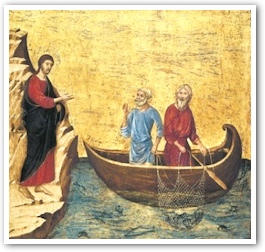Whoever Loses His Life Will Save It
- SAINT ALBERT THE GREAT
Do you want to journey by the shortest road, the straight and safe way to eternal bliss, unto your true country, to grace and glory?
 |
Strive with all your might to obtain habitual cleanness of heart, purity of mind, quiet of the senses. Gather up your affections and with your whole heart cling to God.
Seek out with jealous care the place, time, and means most suited to quiet and contemplation, and lovingly embrace silence and solitude.
Beware the dangers of which the times are full; avoid the agitation of a world never at rest, never still.
Let your chief study be to gain purity, freedom, and peace of heart. Close the doors of your senses and dwell within, shutting your heart as diligently as you can against the shapes and images of earthly things. Of all the practices of the spiritual life purity of heart stands highest, and rightly, for it is the end and reward of all our labors ...
Wherefore you should employ all your diligence and skill in order to free your heart, senses, and affections from whatever could trammel their liberty, or could restrain or ensnare your soul. Strive earnestly to gather in the wandering affections of your heart and fix them on the love of the sole and pure Truth, the Sovereign Good; then keep them, as it were, enchained within you.
Fix your gaze unwaveringly upon God and divine things; spurn the follies of earth and seek to be wholly transformed in Jesus Christ, yea, even to the heart's core.
 This is Meaghen Gonzalez, Editor of CERC. I hope you appreciated this piece. We curate these articles especially for believers like you.
This is Meaghen Gonzalez, Editor of CERC. I hope you appreciated this piece. We curate these articles especially for believers like you.
Please show your appreciation by making a $3 donation. CERC is entirely reader supported.

Acknowledgement
Saint Albert the Great. "Whoever Loses His Life Will Save It." excerpt from On Union with God (London: Continuum Publishing, Inc. 2000)
On Union with God is reprinted with permisison. This excerpt appeared in Magnificat.
The Author
Albertus Magnus, also known as Albert the Great, was one of the most universal thinkers to appear during the Middle Ages. Even more so than his most famous student, St. Thomas of Aquinas, Albert's interests ranged from natural science all the way to theology. He made contributions to logic, psychology, metaphysics, meteorology, mineralogy, and zoology. He was an avid commentator on nearly all the great authorities read during the 13th Century. He was deeply involved in an attempt to understand the import of the thought of Aristotle in some orderly fashion that was distinct from the Arab commentators who had incorporated their own ideas into the study of Aristotle. Yet he was not averse to using some of the outstanding Arab philosophers in developing his own ideas in philosophy. His superior understanding of a diversity of philosophical texts allowed him to construct one of the most remarkable syntheses in medieval culture. His books in print include: On the causes of the properties of the elements, Questions concerning Aristotle's On animals, The commentary of Albertus Magnus on book 1 of Euclid's Elements of geometry, On animals: a medieval summa zoologica, The Speculum astronomiae and its enigma: astrology, theology, and science in Albertus Magnus and his contemporaries, Albert & Thomas: selected writings, and On union with God.
Copyright © 2000 Saint Albert the Great

